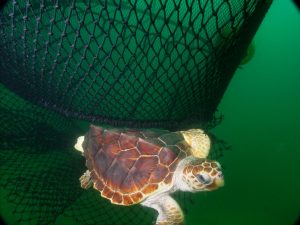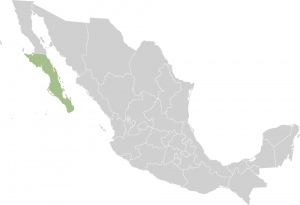Expanding fisheries management and marine conservation across borders
By Mitchell Rider, SRC master’s student
In 2006, the U.S. Congress reformed the Magnuson-Stevens Fishery Conservation and Management Act (MSA) – an act that directs marine fisheries management – by amending the High Seas Driftnet Fishing Moratorium Protection Act. This new amendment directed Secretary of Commerce to recognize foreign nations identified as participating in the bycatch of protected living marine resources (PLMRs) by including them in a biennial report presented to Congress. The responsibility of identifying participating foreign nations was delegated to NOAA Fisheries. The procedure for identification was delineated as follows: Once participation in bycatch is confirmed, NOAA must consult with the participating nation to inform them about the MRA, define the requirements of meeting positive certification, offer help in meeting that certification, and outline the consequences of receiving negative certification. Positive certification is met when a management plan to regulate bycatch is implemented and yields results comparable to that of the U.S. Negative certification is received when the participating nation fails to do so, and this is met with U.S. sanctions.

Image of a loggerhead turtle escaping a net equipped with a turtle excluder device (TED). [By NOAA – http://www.nmfs.noaa.gov/pr/images/turtles/loggerhead_ted-noaa.jpg, Public Domain, https://commons.wikimedia.org/w/index.php?curid=24936235]
Loggerheads nest along the coast of Japan, but perform developmental migrations taking them into the North Pacific basin where a proportion of the population recruits into the Gulf of Ulloa along the Pacific coast of Baja California Sur. It is in this location off the coast of Mexico loggerheads are subjected to high rates of bycatch by bottom-set nets targeting commercially important species like halibut. Mexico was identified after the concurrent discovery of >1,000 beached loggerhead carcasses and 88 loggerheads captured in bottom-set nets.
Upon identification, Mexico initially denied the bycatch of loggerheads even though they had agreed to reduce bycatch rates. At this point, the Mexican government disregarded its collaboration with the U.S. to test turtle friendly fishing gear, and instead proposed a plan to establish a protected area for the loggerhead within the Gulf of Ulloa. In response, the U.S. decided, as a compromise, to grant Mexico more time to establish this protected area. Instead, Mexico utilized this time to establish a partial fishing reserve. Since Mexico did not comply with U.S. regulation standards, the U.S. gave Mexico a negative certification. Almost a year later, Mexico established new loggerhead bycatch control measures, which ultimately lead the U.S. to grant a positive certification.

A map of Mexico where the Baja California Sur (BCS) is shaded in with green.[CC BY-SA 3.0, https://commons.wikimedia.org/w/index.php?curid=63837]
Works cited
Senko, J., L. D. Jenkins, and S. H. Peckham. 2017. At loggerheads over international bycatch: Initial effects of a unilaterally imposed bycatch reduction policy. Marine Policy 76:200-209.
